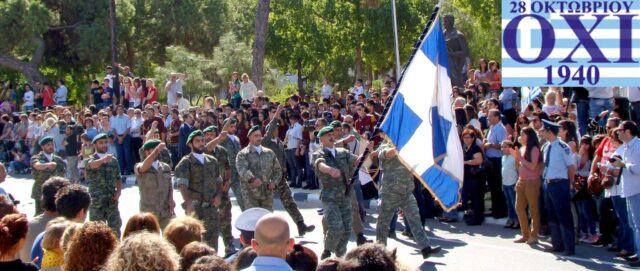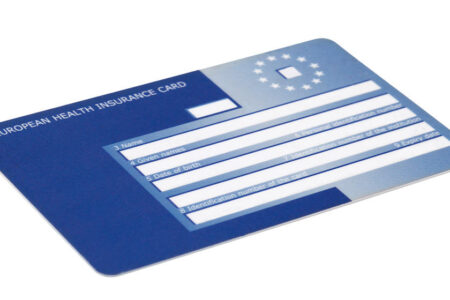Ochi Day (Greek: “Oxi,” meaning “no”) is one of the most significant national holidays celebrated not only in Greece but also in Cyprus. It is a day of remembrance, courage, and patriotism, when the entire Greek nation remembers the historic refusal to capitulate to Fascist Italy in 1940. For Cypriots, this holiday has special significance: it embodies the island’s spiritual connection to mainland Greece and recalls the struggle for freedom and independence.

Contents
Historical events preceding the holiday
On October 28, 1940, at 3:00 a.m., Italian Ambassador Emanuele Grazzi delivered an ultimatum from Mussolini’s government to Greek Prime Minister Ioannis Metaxas. Italy demanded permission to deploy troops and occupy strategic points in Greece. Metaxas’s response was brief and decisive: “Ochi!” —”No!”
A few hours later, Italian troops invaded Greece from Albania, beginning the Greco-Italian War. Despite overwhelming numbers, the Greeks put up a powerful resistance and managed to push the Italians back across the border. This heroic act became a symbol of national dignity, and the day of the refusal to capitulate became a celebration of independence and fortitude.
The Significance of Ohi Day for Cyprus
Although Cyprus was under British rule at the time, the reaction of the island’s population was unanimous. Cypriots, who considered themselves part of the “Greek world,” perceived the events of October 28, 1940, as a personal challenge and an expression of national unity.
From the first days of the war, thousands of Cypriots volunteered for the British Army to fight on the Greek side against the Nazi forces. According to historical records, approximately 30,000 Cypriots took part in the fighting, many of whom were killed or captured. Among the participants were not only men but also women—nurses, signalmen, and Red Cross volunteers.
For Cyprus, Ohi Day became more than just a historical remembrance, but an expression of a national idea: loyalty to freedom, resistance to dictatorship, and solidarity with Greece.
How the holiday is celebrated in Cyprus
Okha Day is celebrated annually on October 28th and is an official public holiday. On this day, celebrations, rallies, and parades take place across the country.

Ceremonies at monuments
The morning begins with wreath-laying at war memorials, monuments to World War II heroes, and those who fought in the resistance. The national anthems of Cyprus and Greece are played in the main city squares.
Military and school parades
The main celebrations take place in Nicosia, Limassol, Larnaca, Paphos, and Ayia Napa. Schoolchildren, students, and cadets march in a ceremonial parade carrying flags. Girls often wear traditional Greek costumes, and boys wear the uniforms of the evonotes (elite soldiers).

Church services
All Orthodox churches hold liturgies in memory of those who died for freedom. Priests read prayers for Greece and Cyprus, and parishioners light candles in gratitude and remembrance.
Cultural events
Many schools and cultural centers host theme nights, theatrical performances, and concerts. Children recite poems and perform patriotic songs dedicated to the heroism of the Greeks. Museums open exhibitions dedicated to the events of World War II and the contribution of Cypriots to the fight against fascism.
Decorating streets and houses
Greek and Cypriot flags are hung in towns and villages, and streets are decorated with national symbols. Shopping malls and schools are adorned with slogans such as “Ziτω η Ελευθερία!”—”Long live freedom!”—and “28 Οκτωβρίου 1940—ΔΕΝ ΞΕΧΝΩ!”—”Let’s not forget October 28, 1940!”
Symbolism of the holiday
The main symbol of the holiday is the word “Ohi,” which has become an expression of defiance and national will. For Cypriots, it symbolizes faith in justice and a willingness to defend freedom under any circumstances.
This day embodies the shared spirit of Hellenism—the cultural and spiritual unity of Greece and Cyprus, based on Orthodoxy, language, and history. The holiday unites generations and reminds us that even a small country can say “no” to dictatorship and aggression.
Participation of Cypriots in World War II
Although Cyprus was not directly involved in the military operations on its territory, its residents made a significant contribution to the Allied victory. Cypriot soldiers served in British units in the Balkans, North Africa, and the Middle East. Many distinguished themselves in the battles of El Alamein and in the operations to liberate Greece.
After the war, their names were inscribed on memorials in Nicosia and other cities. Every year on Okha Day, descendants of the war veterans lay wreaths and thank the veterans for their sacrifice.
Ohi Day and Modern Cyprus
Today, the holiday retains not only historical but also educational significance. Schools in Cyprus devote special attention to this day: students study the causes and consequences of World War II, read letters from soldiers, and discuss the values of freedom and peace.
State television channels broadcast documentaries, interviews with veterans, and themed concerts. In Cyprus, Ohi Day is perceived as a day of national unity, when the entire society remembers its roots and unites around shared values.
Festive atmosphere and folk traditions
Following the official events, cities host public celebrations. Music fills the squares, sirtaki and hasapiko dances are performed, and Greek and Cypriot dishes are served—souvlaki, kleftiko, halloumi, and lokoumades.
Many families gather to celebrate the holiday with loved ones. It’s a day of joy and pride, but also a day of remembrance, when elders teach the young about the meaning of the word “no” spoken 85 years ago.
Why is this day important today?
The modern meaning of Ohi Day extends beyond this historical event. It reminds us of the need to defend democracy, independence, and the right to one’s own choice. For Cyprus, which has endured partition and political trials, this holiday has become a symbol of resilience and faith in justice.
It unites all the inhabitants of the island – Greek Cypriots, the descendants of veterans and the younger generation, who see this day as a reminder that freedom is never given for free, but always the result of the determination to say “no” to oppression.
Ohi Day in Cyprus is more than just a historical date; it’s an important part of national identity. It unites past and present, Greece and Cyprus, generations and ideals. This day reminds us that courage and dignity can change the course of history, and that the word “no,” spoken with faith and honor, can become an eternal symbol of freedom.

















